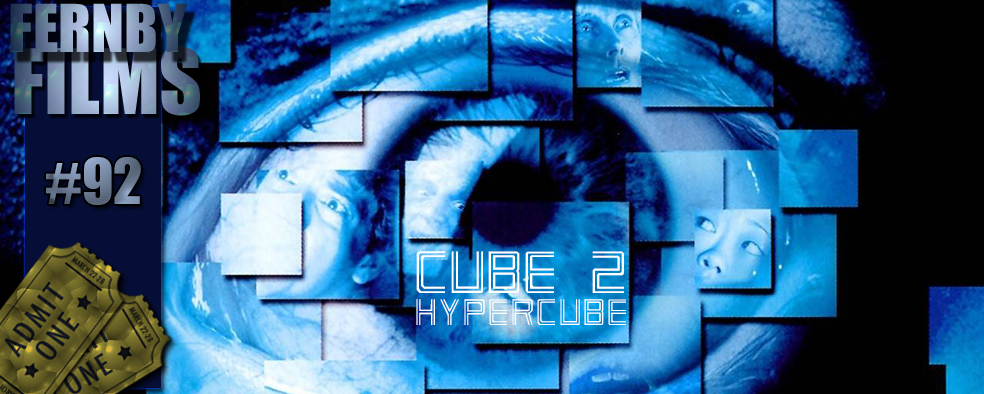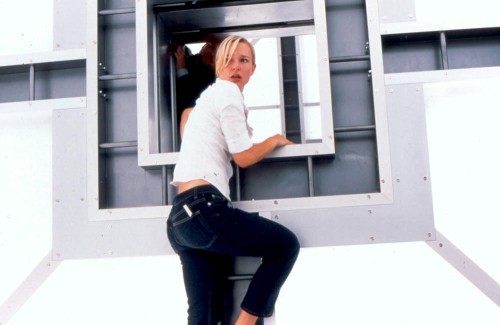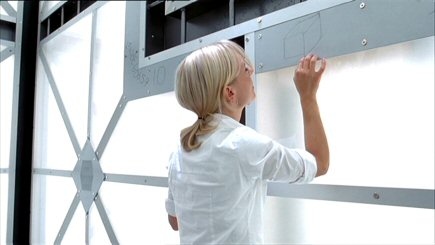Movie Review – Cube 2: Hypercube
Bigger-budget sequel has more creative boob-trap puzzles, more mysterious strangers, and better visual effects. Hypercube lacks the gritty nelancholy of the original, but on its own is a dynamite follow-up.

– Summary –
Director : Andrej Sekula
Year Of Release : 2002
Principal Cast : Kari Matchett, Geraint Wyn Davies, Grace Lynn Kung, Neil Crone, Matthew Ferguson, Lindsey Connell, Greer Kent, Bruce Gray, Barbara Gordon.
Approx Running Time : 95 Minutes
Synopsis: Eight strangers awaken with no memory and find themselves in a puzzling cube shaped room where the laws of physics do not always apply
What we think : Bigger-budget sequel has more creative boob-trap puzzles, more mysterious strangers, and better visual effects. Hypercube lacks the gritty nelancholy of the original, but on its own is an enteraining – if forgettable – follow-up.
**********************
Following up a film like Cube must have been a hard ask for anybody, and since the original director decided not to return, he handed the reins to Andrzej Sekula, the man behind Tarantino’s camera for films like Reservoir Dogs and Pulp Fiction. Cube 2: Hypercube, takes the premise of the original film and expands it from the inter-dimensional, to the extra-dimensional realms of quasi-science.
Set in what appears to be a different cube, capable of bending time and space due to something known as a tesseract (which bends time and space, if the science it to be believed), a new group of victims set about trying to unearth the new cube’s secret, and escape, preferably in reverse order. With twists and turns throughout the plot, and within the characters, Cube 2: Hypercube is a “bigger is better” example of film-making, and not necessarily one that makes much sense. While the inevitable contrivances of the characters being stuck in the cube rooms and their associated traps play out, there is also a feeling of conspiracy and a larger power-play at stake, with the “end of the world” vibe coming out towards the end of the film.

Leader of the group this time is Kate Filmore, a psychologist with, it appears, plenty to hide. She teams up with fellow prisoners Simon and Sasha to find a way out of what is an increasingly bizarre and horrifying example of the “improvements” made on the original cube. Touch sensitive entryways, a reliance on the CGI aspect of the film, and a logic-defying plot contrivance all add up to make this sequel less about human interactions and more about “look at what we spent money on” special effects.
It appears that the cube, this time around, is sitting inside a tesseract, which is kind of like an alternate (or sub) dimension within our own. Time and space don’t work as we would normally think inside a tesseract, which results in some interesting story turns as people who have died reappear, die again, move through and within time and space with an abandon usually reserved for Looney Tunes characters. Wobbly science, used to explain the technology in a similar way to the original film, doesn’t stack up as it did previously.

While initially, you’d view Hypercube as a great follow-up to the original film, after time passes you start to realise just how badly you’ve been duped by the film-makers, who have taken a great idea, flipped it on it’s head and tried to expand the concept in a way that is staggeringly unbelievable. At least the original film was grounded in a kind of reality: it could exist. Here, that’s out the window, and thus negates any tension that could be built up within the narrative. It’s disappointing, the turn the film-makers took this time, although you can see that they were trying. The final scene, with a major twist and shocking outcome, sets the film up for another sequel, however the emotional pay-off this time round is less than the sum of the parts, and certainly not as profound as the original film.
Sekula’s ability to handle sub-par effects is excellent, and the cast perform admirably, however, they are let down by a script that’s confusing and a world that spins so far out of control it becomes ho-hum, rather than shocking. You’d probably see better “techno-science” on a 60’s episode of Doctor Who. The effects, as mentioned, are sub-par, and it’s unfortunate that the film’s reliance upon them impinges on the quality overall: had the effects been better, the film could possibly have gained a further couple of marks.

As it stands, Cube 2: Hypercube is a little bit of a let-down, only held together by the promise of what could have been, and although it’s a valiant attempt to continue the story of the series, by comparison to the original, it’s a weaker, less thrilling adventure into madness.








I agree that Hypercube doesn't stack up to the original (which would be very hard), although in some ways it makes the traps a lot more unpredictable, and it probably would end up being just as crazy as it ends up.
I guess the problem with making such a good original film is that it's basically impossible for sequels to be even as good as the first.